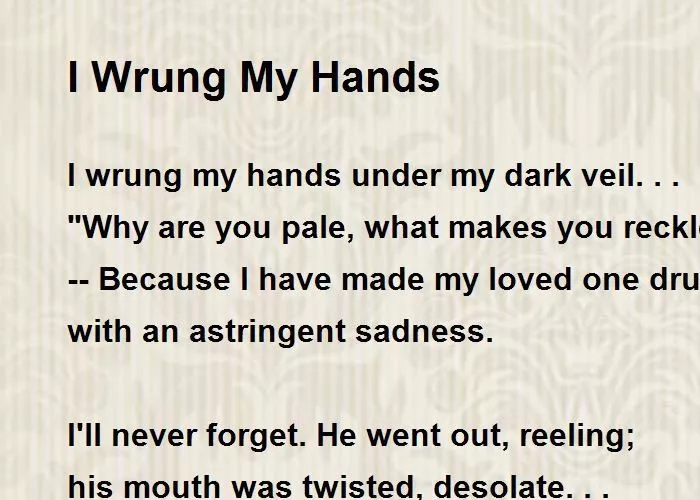Welcome to Poem of the Day – I Wrung My Hands by Anna Akhmatova..
Anna Akhmatova, one of Russia’s most renowned poets, is known for her poignant and emotionally charged works that capture the complexities of personal loss, historical trauma, and the human condition. In the poem “I Wrung My Hands,” Akhmatova’s ability to convey deep sorrow and inner turmoil becomes evident. This essay will provide a detailed analysis of “I Wrung My Hands,” exploring the poem’s themes, structure, and the subtle yet powerful language Akhmatova uses to communicate grief, vulnerability, and resilience.
I Wrung My Hands Poem Explanation
Before diving into the poem itself, it’s important to understand the context in which Akhmatova wrote. Her life was marked by immense personal suffering and the oppression of Soviet Russia under Stalin’s regime. The poet’s personal tragedies, including the arrest and exile of her first husband, the death of her son, and the general atmosphere of fear and silence pervading Soviet society, profoundly shaped her work. “I Wrung My Hands” likely reflects the collective and personal anguish of living in an era where suffering was both ubiquitous and largely unspoken.
The Title and Opening Line
The title, “I Wrung My Hands,” immediately evokes a sense of distress and helplessness. The image of wringing hands is a universal gesture of anxiety, regret, and emotional struggle. This action, which typically denotes the inability to affect a situation, captures a moment of intense personal or emotional crisis.
The poem begins with a direct, almost confessional tone: “I wrung my hands, and the tears came.” Here, the speaker’s physical manifestation of grief, wringing hands, is paired with tears, creating a dual expression of emotional release. The imagery is raw and uncomplicated, suggesting that the speaker has reached a breaking point where words are insufficient and only tears and bodily movements can express the depths of their sorrow. The simplicity of the language enhances the universality of the sentiment, making the emotional experience accessible to all readers, irrespective of cultural or historical context.
Themes of Loss and Grief
The central theme of “I Wrung My Hands” is undoubtedly grief and loss. Akhmatova’s use of physical gestures—such as wringing her hands—underscores the weight of emotional pain that cannot be fully articulated. The tears that accompany this act of wringing hands imply an overwhelming force of sorrow, as if the speaker is trying to hold onto control but is unable to do so. In this way, Akhmatova captures the uncontrollable nature of grief, something that cannot be confined to words or restrained by willpower. The act of wringing hands is futile and symbolic, representing the speaker’s realization that her grief is beyond her control.
Akhmatova’s poems often reflect the intense emotionality of personal suffering, but in “I Wrung My Hands,” the suffering is not confined to the individual; it resonates with collective grief. The speaker’s sorrow is not simply a private matter but a reflection of broader societal pain, perhaps alluding to the emotional toll of living under Stalin’s oppressive regime, where so many lived in fear and anxiety.
The Use of Nature and Religious Imagery
Akhmatova often utilizes nature and religious imagery in her poetry to deepen the emotional resonance of her work. In “I Wrung My Hands,” the connection between personal grief and the natural world is apparent in her references to how the world around her responds to her sorrow. “The sky darkened,” she writes, implying that nature itself reflects the mood of the speaker. This creates a parallel between the internal emotional state and the external environment, as if the speaker’s grief has caused the world to mirror her inner turmoil.
The religious undertones in the poem are also noteworthy. The wringing of hands, a gesture often associated with mourning, can also be read as a sign of seeking absolution or divine intervention. Akhmatova frequently explored spiritual themes, and here, her use of a gesture that has religious connotations amplifies the sense of despair, as though the speaker is not only grieving personal loss but also searching for solace in a world that offers little.
The Structure and Language
Akhmatova’s choice of structure and language in this poem contributes to the overall sense of emotional restraint, despite the powerful feelings the poem conveys. The lack of punctuation and the simplicity of her phrasing mirror the rawness of the emotions at play. The line breaks do not offer the reader much respite; rather, they push the poem forward, mirroring the relentless nature of grief.
The plainness of the language also serves to enhance the emotional impact. Akhmatova’s deliberate avoidance of overtly complex metaphors or bombastic language keeps the focus on the human experience of loss. This simplicity contrasts sharply with the depth of the feeling, creating a subtle tension in the poem. It is as though Akhmatova is speaking directly to the reader, unguarded and without pretense, allowing the raw emotion to be felt in its most unfiltered form.
Conclusion
“I Wrung My Hands” is a powerful and evocative exploration of grief, loss, and the emotional toll of living under an oppressive regime. Akhmatova’s use of simple yet profound imagery, combined with her sparse language, allows the poem to resonate deeply with readers. The wringing of hands serves as a symbol of the futility of trying to control or contain grief, and the tears that accompany this act are a manifestation of sorrow that cannot be restrained. Through this poem, Akhmatova not only explores personal suffering but also taps into a collective sense of despair, creating a work that speaks to the shared human experience of loss, vulnerability, and the search for meaning in a world fraught with hardship.

